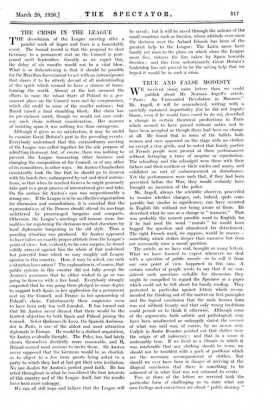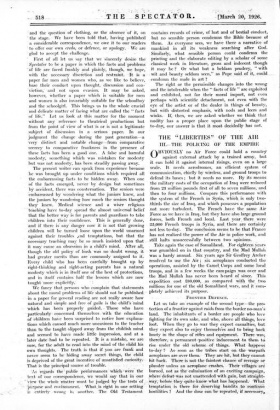TRUE AND FALSE MODESTY
WE received many more letters than we could publish about Mr. Norman Angel's article, " Paris : An Unrecorded Revolution in Manners." Mr. Angell, it will be remembered, writing with a carefully sustained impartiality (for he did not impute blame, even if he would have cared to do so), described a change in certain theatrical productions in Paris which seemed to have passed without notice and to have been accepted as though there had been no change at all. He found that in some of the ballets both women and men appeared on the stage with no clothes on except a tiny girdle, and he noted that family parties of French people were present at these performances without betraying a trace of surprise or reprobation.
The schoolboy and the schoolgirl were there with their fathers and their mothers or their uncles and aunts, and exhibited no sort of embarrassment or disturbance. Yet the performances were such that, if they had been presented before the War, they would certainly have brought an incursion of the police.
Mr. Angell, always the scientific observer, proceeded to wonder whether changes, not, indeed, quite com- parable but similar in significance, can have occurred in English life without our being aware of them. He described what he saw as a change in " manners." That was probably the nearest possible word in English, for if he had used the word " morals " he would have begged the question and abandoned his detachment.
The right French word, we suppose, would be moeurs- something which strikes deeper than manners but does not necessarily raise a moral question.
The article, as we have said, brought us many letters. What we have learned to expect whenever we deal with a question of public morals—so to call it from our own point of view—happened in this case. A certain number of people wrote to say that if we con- sidered such questions suitable for discussion they might be compelled to regard the Spectator as a paper which could not be left about for family reading. They protested in particular against letters which recom- mended the thinking out of the matter on first principles and the logical conclusion that the nude human form was not without beauty and that only wrong traditions could permit us to think it otherwise. Although some of the arguments, both artistic and pathological, may have been misdirected or unhappily stated the essence of what was said was, of course, by no means new. Carlyle in Sartor Resartus pointed out that clothes were the origin of all indecency ; and that in a sense is undeniably true. If we lived in a climate in which it was intolerable that any clothing should be worn, we should not be troubled with a pack of problems which are the necessary accompaniment of clothes. Nor should we ever have been in danger of arriving at the illogical conclusion that there is something to be ashamed of in what God was not ashamed to create.
Two or three of the letters we received took the particular form. of challenging us to state what our own feelings and convictions are about " public decency " and the- question of clothing, Or the absence -of it, on ' the stage. -•We •have been told that, having published a considerable correspondence,- we owe it to our -readers to offer one own credo,- or defence, or 'apology. - We are ' glad to accept the challenge. - • - ' First of all let us say • that we 'sincerely desire the Spectator to 'be a paper in which the. facts ancfprbblema "Of life are faced frankly and plainly, though, we hope,' with the necessary -distition and restraint. it is a paper for men and women who, as we like to believe, base their conduct upon thought,- discussion and con-- victim,– and not upon evasion. It may --be asked, 'however, Whether' a paper which is • suitable for men and women is also invariably suitable for the schoolboy and the schoolgirl. This brings us to the whole 'crucial and delicate matter of facing what are called the " facts 'of life." Let us look at this matter for the moment without any reference to theatrical productions but from the point of view of what 'is or is not a legitimate subject of diseussion in" a serious * paper. In our judgment the ' change during the past generation—a *very distinct and *notable changefrom comparative secrecy to comparative frankness in the presence of these facts has been a good-One. A false and harmful modesty, soMething Which was *mistaken for modesty but was not modesty, has been steadily passing away.
The present 'writer can speak from experience because' he was brought up under conditions 'which required all The embarrasSing facts to be hidden away. When one 'of the facts emerged, "neVer • by design but sometimes .13Y accident, there was consternation. The seniors were embarrassed' by -wondering what the juniors knew, and the juniors by wondering how' much the seniors thought they krieW. Medical Seience and' a wiser religious *teaching have to=day spread the almost univerSid- belief that the better *ay 'is for parents and guardians to take 'children into their Confidenee. This is generally done; 'and if there is any danger now it is not that growing children will be filmed loose" upon the world unarmed against their troubles ind temptations, but that the necessary teaching -may be so much insisted upon that it may cause' an obsession in a child'S mind. After all, though the Old- policy of hush was no -doubt wrong, it had greater merits than are •cominonly -assigned to it Every child who hai been carefully brought up by right-thinking and right-acting parents' has a natural modesty which is itself one of the best of protections, and in itself contains half the lessons which are now taught -more explicitly: We fancy that persons- who complain that statements about the moral problems of life should not be published - in a paper for :general reading are not really- aware how natural and simple and free of- guile is the child's:mind Which has been' properly guided. • Those who -have particularly. concerned -themselves . with the education cif-children haVe been= surprised - to notice how. explana- tion's which caused -much more uneasiness to. the teacher than to the' tatight•slipped 'away. from the childish mind and seemed to have: made little . impression; and at a 'later date:had to be repeated. It is a mistake, we are Sure, for the adult toreaclinto the mind of the child his Crain thetights.:, The truth is. that if you. are frank and never' seem to be' hiding away secret things, the *child is deprived of the great incentive of unsatisfied curiosity:. That is the principal source of trouble. . . : 'As regard's the public performances whichl were the text- of Our correspondence, we would- Say that "in'our "'view the whole "matter must be judged- by the' tests 'of inirpose-ina enVironthent. - What,is right in one setting i:; entirely wrong in another. The Old Testament contains records of crime, of lust and of bestial conduct, but no sensible person condemns the Bible because of them. As everyone sees, we have there a narrative of mankind in all its weakness searching after God. Similarly, what sensible person could condemn the printing and the elaborate editing by a scholar of some classical work in literature, gross and indecent though . it may be ? Or what but a beldam prudery, " with wit and beauty seldom seen," as Pope said of it,, could • condemn the nude in art ?
The right or the permissible changes into the wrong and the intolerable when the " facts of-life " are exploited and exhibited, not for their moral import, not even perhaps with scientific detachment, not even with the eye of the artist or of the dealer in things of beauty, but with distorted emphasis, with nods and leers and winks: If,. then, we are asked whether we think that -nudity has a proper place upon the public stage of to-day, our answer is that it most decidedly has not. •



























































 Previous page
Previous page